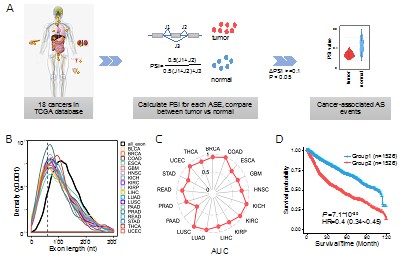A study published in Science Advances on Aug. 17 revealed a widespread length dependent splicing regulation in cancer. By analyzing various transcriptome data from The Cancer Genome Atlas (TCGA), this study discovered a common feature of cancer-specific splicing dysregulation and provided important clinical implications in cancer diagnosis and therapies.
Over 95% of human genes undergo alternative splicing (AS), generating multiple mRNA isoforms with distinct functions from a single gene. The widespread splicing dysregulation is one of the molecular hallmarks of cancer, and targeting the mis-spliced genes may be a powerful therapeutic strategy against cancers. Therefore systematic study of AS in cancer is critical for cancer precision medicine. While several studies provided useful information by analyzing various transcriptome data, there is still a lack of general trend for cancer-associated splicing dysregulation and the underlying mechanisms remain unclear.
In this study, a comprehensive analysis of AS changes was conducted using transcriptome data from thousands of patients in 18 types of cancers, revealing an unexpected length dependency in cancer-associated exons. Compared to typical exons, the short exons are more likely to be mis-spliced and preferentially excluded in almost all cancers. These cancer-associated short exons (CASEs) are more conserved, more likely to encode in-frame peptides and functional enrichment in GTPase regulators and cell adhesion. The researchers further developed machine learning algorithms with CASEs as diagnostic markers and defined a CASE-based risk factor to accurately predict the prognosis of cancer patients. Finally, they determined the possible mechanisms for this length-dependent regulation, which is regulated by elevated transcription rate and alteration of certain RNA binding proteins in cancers.

(A) Schematic diagram to identify cancer-associated ASEs. (B)The length distribution of all human exon and cancer-associated exons in each cancer type. (C) The ROC curve of the random forest model in each cancer type. (D) Kaplan-Meier curve of cancer patients grouped by the CASE-based risk factor. (Image provided by Dr. WANG Zefeng’s group)
Collectively, this study reveals a general rule for splicing dysregulation in cancers, provides a simple and practical route for cancer stratification, and uncovers the potential underlying mechanisms. Since the splicing dysregulation was recently found to associate with cancer immunotherapy and drug assistant, this study provides valuable information for cancer prediction with clinical implications.
This research entitled “A widespread length-dependent splicing dysregulation in cancer” was published online in the journal of Science Advances on August 17, 2022. Dr. WANG Zefeng from Shanghai Institute of Nutrition and Health (SINH) of Chinese Academy of Sciences and Dr. WANG Yang from Dalian Medical University are the co-correspondence authors of this work. Dr. ZHANG Sirui from SINH is the first author of this paper.
The research is supported by the National Key Research and Development Program of China, the National Natural Science Foundation of China, etc.
Media Contact:
WANG Jin
Shanghai Institute of Nutrition and Health,
Chinese Academy of Sciences
Email: wangjin01@sinh.ac.cn
Web: http://english.sinh.cas.cn/

